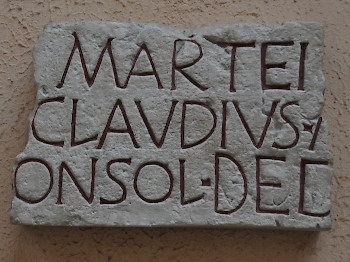Rome, Porta Capena
Q1632777Porta Capena: southeastern gate in Rome's Servian Wall, close to the Circus Maximus, beginning of the Via Appia.

Anyone entering Rome by way of the Via Appia and the Baths of Caracalla would have seen before him the Porta Capena, an old city gate that was incorporated into the Aqua Marcia aqueduct and was consequently left standing when the Republican wall was destroyed. Juvenal writes that it was “a place that constantly dripped.”note The Roman police kept an eye on passing foreigners, as Philostratus (c.170-c.245) describes in his vie romancée of the charismatic philosopher Apollonius of Tyana, who lived during the reign of the emperor Nero (r.54-68):
They accordingly approached the gates of Rome, and the sentries asked them no questions, although they scanned their dress with some curiosity; for the fashion of it was that of religious ascetics, and did not in the least resemble that of beggars.
And they put up at an inn close to the gate, and were taking their supper, for it was already eventide, when a drunken fellow with a far from harsh voice turned up as it were for a revel; and he was one it seems who was in the habit of going round about Rome singing Nero's songs and hired for the purpose, and anyone who neglected to listen to him or refused to pay him for his music, he had the right to arrest for violating Nero's majesty.note
According to rabbi Joshua ben Levi, a Jewish sage living in the third century CE, the Messiah spent some time at the Porta Capena. One day the rabbi, so the story goes, was visited by the prophet Elijah, who, it was said, would return to earth to announce the Last Judgment. Joshua made used of the opportunity to ask if he would be going to heaven and when the Messiah would restore Israel.
Elijah answered, “Go and ask him yourself.”
“Where can I find him?”
“At the city gate of Rome.”
“How shall I recognize him?”
“He is sitting among the poor lepers [and is a leper himself]. They all take off their bandages all at once and then put them back on in the same way, but he removes them one at a time, because he thinks: maybe someone will need me and in that case I mustn’t be held up.”
Rabbi Joshua ben Levi went up to him and said, “Peace be with you, rabbi and teacher.”
He replied, “Peace be with you, son of Levi.”
He asked, “When are you coming, master?”
He said, “Today.”
Rabbi Joshua ben Levi went back to Elijah, and the prophet asked him, “What did he say to you?”
“He said, ‘Peace be with you, son of Levi.’”
Then Elijah said, “That means he has assured you and your father of a place in the world to come.’”
He said, “Then he lied to me, because he said, ‘I’m coming today,’ but he hasn’t come.”
Then Elijah said, “What he meant was: today, if you follow His voice.”note
It is known that Rabbi Joshua paid a visit to Rome. Thus we can assume that he knew the Jewish neighborhood that was in front of the Porta Capena, along the Via Appia, and we may assume that sick beggars did in fact sit by the gate.
Except for the gate, the aqueduct, the beggars, there were sanctuaries for Fortuna Redux and for Honor and Virtue in this area.note Inside the gate was the monumental Septizodium.